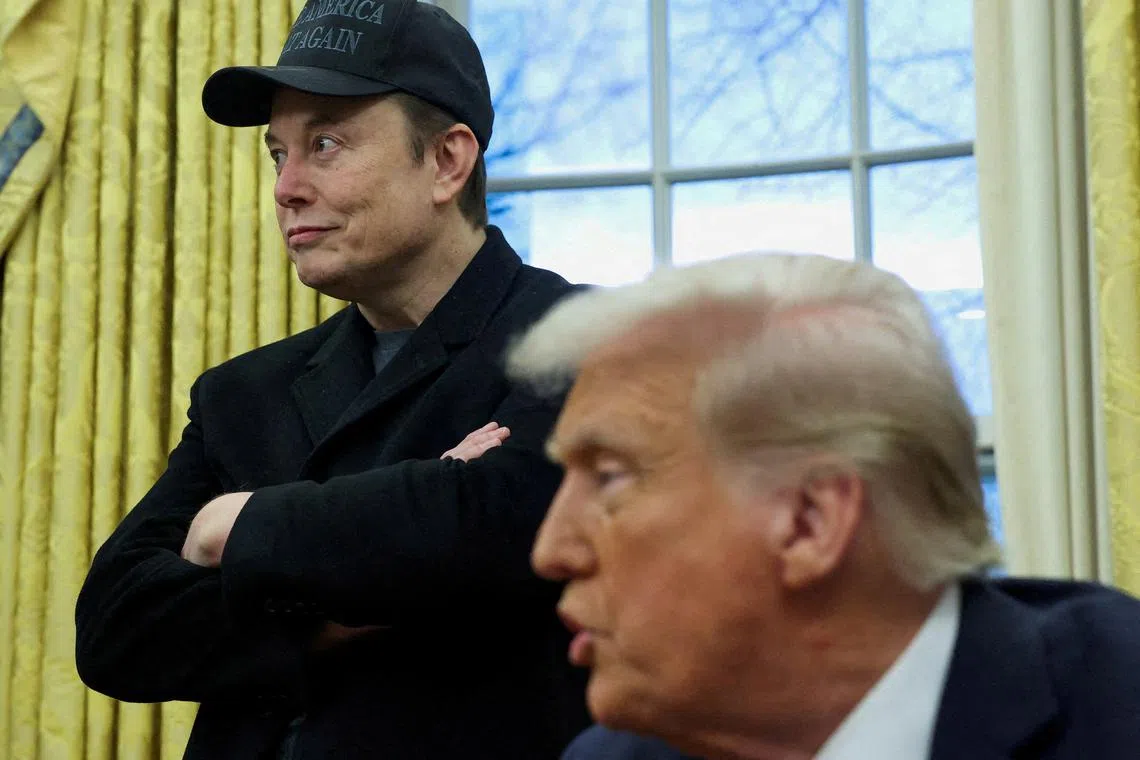US judge finds Musk’s USAid cuts likely unconstitutional, blocks him from making more cuts
Sign up now: Get ST's newsletters delivered to your inbox

Mr Elon Musk listens to US President Donald Trump speak in the Oval Office of the White House in Washington DC on Feb 11.
PHOTO: REUTERS
WASHINGTON - A federal judge on March 19 blocked billionaire Elon Musk and the Department of Government Efficiency (Doge) from taking any more steps to shut down the US Agency for International Development (USAid), saying their efforts to close the agency likely violated the US Constitution.
In a preliminary ruling, US District Judge Theodore Chuang in Maryland ordered President Donald Trump’s adviser Musk and the agency he spearheads to restore access to USAid’s computer systems for its direct and contract employees, including thousands who were placed on leave.
The ruling came in response to a lawsuit by current and former USAid employees, one of several currently pending over the rapid dismantling of Washington’s primary humanitarian aid agency.
“Today’s decision is an important victory against Elon Musk and his Doge attack on USAid, the US government and the Constitution,” said Mr Norm Eisen, executive chair of State Democracy Defenders Fund, a lawyer representing the 26 anonymous plaintiffs in the case.
Mr Trump told Fox News his administration would appeal the ruling. “I guarantee you we will be appealing it. We have rogue judges that are destroying our country,” he said on The Ingraham Angle.
Mr Trump, a Republican, on his first day back in office, ordered a 90-day freeze of all US foreign aid and a review of whether aid programmes were aligned with his administration’s policy.
Soon after that, Mr Musk and Doge gained access to USAid’s payment and e-mail systems, froze many of its payments and told many of its staff they were being placed on leave.
On Feb 3, Mr Musk wrote on X that he had “spent the weekend feeding USAid into the wood chipper”.
The plaintiffs claimed in their Feb 13 lawsuit that Mr Musk seized control of USAid and effectively acted as an officer of the US, violating the Constitution’s requirement that such officers be nominated by the president and confirmed by the Senate.
They said Mr Musk and Doge had overstepped the authority of the executive branch of government, by effectively gutting an agency established by Congress.
Judge Chuang, who was appointed by then Democratic President Barack Obama, agreed that Mr Musk and Doge “likely violated the United States Constitution in multiple ways and that these actions harmed not only plaintiffs but also the public interest”.
Mr Musk and Doge argued in court filings that Mr Musk’s role is strictly as an adviser to Mr Trump and that agency officials, not Doge, were responsible for actions challenged by the plaintiffs.
Judge Chuang found that Mr Musk and Doge had effectively exercised direct control over the agency.
In addition to ordering them to restore employees’ computer access, he barred them from disclosing any sensitive employee information.
Judge Chuang did not block the mass terminations of most of USAid’s contracts and personnel, which have ended much of the agency’s operations worldwide and thrown global humanitarian relief efforts into chaos.
He found that while those terminations likely did violate the Constitution, they had been approved by government officials who are not named in the lawsuit.
Secretary of State Marco Rubio said last week that the administration was scrapping more than 80 per cent of USAid’s programmes
In a separate lawsuit brought by USAid contractors, US District Judge Amir Ali in Washington last week ordered the administration to promptly release frozen payments to contractors for past work, but stopped short of ordering it to reinstate the contracts.
The administration failed to pay the full amount of the first batch of payments Mr Ali ordered, totalling about US$671 million (S$894 million) by a March 10 deadline. It has cited the need to individually review payments. On March 17, Mr Ali ordered the government to provide a schedule of when it would make those and all other past due payments, which total close to US$2 billion. REUTERS


